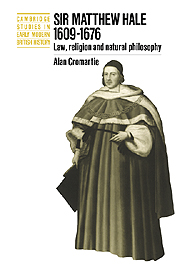Book contents
- Frontmatter
- Contents
- Acknowledgements
- Introduction: a summary life
- Part I Law
- 1 Coke: the appeal to reason
- 2 Selden: the appeal to contract
- 3 The rights of the Crown
- 4 Interregnum
- 5 Protectorate
- 6 Restoration: ‘the nature of laws’
- 7 Restoration: constitutional theory
- 8 Restoration: legal practice
- Part II Religion
- Part III Natural philosophy
- Conclusion
- Appendix: Hale and witchcraft
- Bibliography
- Index
- Titles in the series
5 - Protectorate
Published online by Cambridge University Press: 05 May 2010
- Frontmatter
- Contents
- Acknowledgements
- Introduction: a summary life
- Part I Law
- 1 Coke: the appeal to reason
- 2 Selden: the appeal to contract
- 3 The rights of the Crown
- 4 Interregnum
- 5 Protectorate
- 6 Restoration: ‘the nature of laws’
- 7 Restoration: constitutional theory
- 8 Restoration: legal practice
- Part II Religion
- Part III Natural philosophy
- Conclusion
- Appendix: Hale and witchcraft
- Bibliography
- Index
- Titles in the series
Summary
Hale was consistently a royalist, in the sense that he was anxious to be governed by a king, but he made do, for several years, with serving a Lord Protector. In early 1654, when Hale was first appointed to the bench, Oliver Cromwell must have seemed the saviour of the law. The Rump (which was dissolved the previous April) had been relatively acceptable to lawyers: it was at least the ghost of the legitimate parliament of England; it had done its best, by the fiction of the Keepers, to preserve the essence of the constitution; and was unenthusiastic, in the absence of military pressure, about the projected reform of the courts. Its successor, from June to December, was a body that the army had created. This was a ‘supreme power’, a nominated puritan assembly, self-styled a parliament. The body was internally divided, especially on law reform and tithes, but the greater part was radical in outlook. Their initial reforming proposals were borrowed from the Hale Commission's work, but there was also some support, at least in later months, for replacing existing arrangements with a simplified biblical code. Conservatives could reasonably believe that ‘propriety was struck at’, and the lawyers were exultant when the parliament collapsed. At this propitious moment, the army, led by Cromwell, were faced with the task of governing the country. They would have been fools not to cement their temporary alliance with the law.
- Type
- Chapter
- Information
- Sir Matthew Hale, 1609–1676Law, Religion and Natural Philosophy, pp. 74 - 88Publisher: Cambridge University PressPrint publication year: 1995



